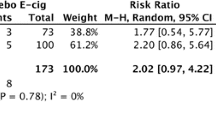Abstract
Treatments that reduce the immediate effects of smoking withdrawal have potential for helping smokers quit. Serotonin-enhancing substances, such as tryptophan and high-carbohydrate diets, have been used in clinical disorders to relieve negative affect, a classic symptom of cigarette withdrawal. This research project investigated the use of tryptophan (50 mg/kg/day) and high-carbohydrate diets, together with more traditional smoking cessation treatment techniques, to ameliorate the smoking withdrawal syndrome and to improve abstinence rates. Subjects were randomly assigned to receive either tryptophan (n=16) or placebo (n=15). Standard smoking cessation treatment was identical for the experimental and control groups and consisted of four 2-hr weekly sessions of multicomponent group therapy. Smoking behavior, symptoms of nicotine withdrawal, and negative affect were assessed during a 2-week withdrawal period. Tryptophan-treated subjects who could not fully abstain were able to smoke fewer daily cigarettes. Reported anxiety and other withdrawal symptoms were lower in the tryptophan group compared with control subjects. These data suggest that serotonin-enhancing substances show promise for use as an adjunct to existing smoking cessation programs.
Similar content being viewed by others
References
Benowitz, N. L. (1983). The use of biologic fluid samples in assessing tobacco smoke consumption. In Grabowski, J., and Bell, C. S. (eds.)Measurement in the Analysis and Treatment of Smoking Behavior, DHHS (PHS) National Institute on Drug Abuse, Washington, DC.
Bosse, R., Garvey, A. J., and Costa, P. T. (1980). Predictors of weight change following smoking cessation.Int. J. Addict. Behav. 15: 969–991.
Bowen, D. J., Eury, S. E., and Grunberg, N. E. (1987). Effects of nicotine on body weight, physical activity, and food consumption in female rats.Pharmacol. Biochem. Behav. 25: 1131–1136.
Grunberg, N. E., and Bowen, D. J. (1985a). The role of physical activity in nicotine's effects on body weight.Pharmacol. Biochem. Behav. 23: 851–854.
Grunberg, N. E., and Bowen, D. J. (1985b). Coping with the sequelae of smoking cessation.J. Cardiac Pulmon. Rehab. 5: 285–289.
Grunberg, N. E., Bowen, D. J., and Morse, D. E. (1984). Effects of nicotine on body weight and food consumptions of rats.Psychopharmacology 83: 93–98.
Grunberg, N. E., Bowen, D. J., Nespor, S. M., and Maycock, V. A. (1985). The importance of sweet taste in nicotine's effects on body weight.Psychopharmacology 87: 198–203.
Grunberg, N. E., Bowen, D. J., and Winders, S. (1986). The effects of nicotine on body weight and food consumption in female rats.Psychopharmacology 90: 101–105.
Hartman, E. (1981). Tryptophan and sleep: Who responds to L-tryptophan? In Perris, C., Struwe, C., and Janssen, B. (eds.),Biological Psychiatry, Elsevier Biomedical, Amsterdam, pp. 613–621.
Hartman, E., and Greenwald, D. (1984). Tryptophan and human sleep: An analysis of 43 studies. In Schlossberger, H. G., Kochen, W., Linzen, B., and Steinhart, H. (eds.),Progress in Tryptophan and Serotonin Research, Walter de Gruyter, New York, pp. 297–304.
Hatsukami, D. K., Hughes, J. R., Pickens, R. W., and Svikis, D. (1984). Tobacco withdrawal symptoms: An experimental analysis.Psychopharmacology 84: 231–236.
Hunt, W. A., and Matarrazzo, J. D. (1973). Three years later: Recent developments in the experimental modification of smoking behavior.J. Abnorm. Psychol. 81: 107–114.
King, R. B. (1980). Pain and tryptophan.J. Neurosurg. 53: 44–52.
Kleges, R. C., Meyers, A. W., Klesges, L. M., and La Vasque, M. D. (1989). Smoking, body weight, and their effects on smoking behavior: A comprehensive review of the literature.Psychol. Bull. 106(2): 204–320.
Lieberman, H. R., Corkin, S., Spring, B., Growdon, J. H., and Wurtman, R. J. (1983). Mood, performance and sensitivity: Changes induced by food constitutents.J. Psychiat. Res. 17: 135–145.
Pechacek, T. F. (1979). Modification of smoking behavior. In Krasnegor, N. (ed.),The Behavioral Aspects of Smoking, DHHS (PHS) National Institute on Drug Abuse, Washington, DC.
Rodin, J. (1987). Weight change following smoking cessation: The role of food intake and exercise.Addict. Behav. 12: 303–317.
Rosenthal et al. (1986). Carbohydrate craving in seasonal affective disorder. Presented at the Annual Meeting of the American Psychological Association, Washington, DC, Aug.
Schneider, N. G., and Jarvik, M. E. (1984). Time course of smoking withdrawal symptoms as a function of nicotine replacement.Psychopharmacology 82: 143–144.
Schwartz, J. L. (1987). Review and evaluation of smoking cessation methods: The United States and Canada, 1978–1985. DHHS (PHS) National Cancer Institute, Washington, DC.
Seltzer, S., Dewart, D., Pollack, R. L., and Jackson, E. (1983). The effects of dietary tryptophan and chronic maxillofacial pain and experimental pain tolerance.J. Psychiat. Res. 17: 181–186.
Shiffman, S. M. (1979). The tobacco withdrawal syndrome.Natl. Inst. Drug Abuse Res. Monogr. 23: 158–184.
Shiffman, S., Shumaker, S. A., Abrams, D. B., Cohen, S., Garvey, A., Grunberg, N. E., and Swan, G. E. (1987). Models of smoking relapse.Health Psychol. 5: 13–27.
Spring, B. J., Chiodo, J., and Bowen, D. J. (1987). Carbohydrates, tryptophan, and behavior: A methodological review.Psychol. Bull. 102: 234–256.
Wack, J. T., and Rodin, J. (1982). Smoking and its effects on body weight and the systems of caloric regulation.Am. J. Clin. Nutr. 35: 366–380.
Wurtman, R. J., Heft, F., and Melamed, E. (1981). Precursor control of neurotransmitter synthesis.Pharmacol. Rev. 32: 315–335.
Author information
Authors and Affiliations
Rights and permissions
About this article
Cite this article
Bowen, D.J., Spring, B. & Fox, E. Tryptophan and high-carbohydrate diets as adjuncts to smoking cessation therapy. J Behav Med 14, 97–110 (1991). https://doi.org/10.1007/BF00846173
Issue Date:
DOI: https://doi.org/10.1007/BF00846173




